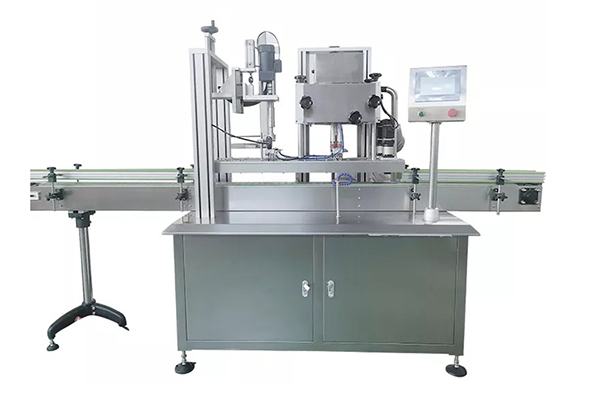Bottle capping machines are essential equipment in the packaging industry, used to secure the tops of bottles to preserve their contents and maintain the integrity of the packaging. These machines come in various types, ranging from manual to fully automatic, and are used for a wide range of products, including food and beverage, pharmaceutical, and chemical products.
Proper capping is crucial in the packaging industry, as it helps to prevent contamination and spoilage of the product, as well as providing an attractive appearance for consumers. In addition, a properly sealed bottle helps to maintain the product’s shelf life and freshness, ensuring customer satisfaction.
Types of Bottle Capping Machines
Manual Capping Machines
Manual capping machines are the most basic type of bottle capping equipment and are typically operated by hand. They are suitable for small-scale operations or for use as a backup machine. These machines are relatively simple to operate, but they can be time-consuming and labor-intensive.
Semi-Automatic Capping Machines
Semi-automatic capping machines are a step up from manual machines and are designed to automate the capping process to some extent. They typically require an operator to manually place the bottle under the capping head, and the machine then applies the cap and secures it in place. This type of machine is ideal for small to medium-sized businesses with moderate capping needs.
Automatic Capping Machines
Automatic capping machines are the most advanced type of capping equipment, and they can handle large-scale capping needs with minimal operator involvement. These machines use sensors and other automated systems to detect the presence of a bottle, apply the cap, and secure it in place. They are highly efficient and can significantly reduce labor costs, making them ideal for large-scale operations.
Comparison of Different Types of Machines
When deciding on a bottle capping machine, it’s important to consider the size of your operation, the types of products you will be capping, and your budget. Manual and semi-automatic machines are typically less expensive, but they can be slower and more labor-intensive. Automatic machines are more efficient and can handle larger volumes, but they are also more expensive. A detailed comparison of the different types of machines will help you choose the best option for your needs.
Working Principle of Bottle Capping Machines
Explanation of the Capping Process
The basic principle behind bottle capping machines is to secure the cap onto the bottle, typically using a combination of pressure and torque. The process involves placing the cap on the bottle, positioning it under the capping head, and then using the machine to apply pressure and secure the cap in place. The exact process may vary depending on the type of machine and the specific cap being used.
Role of Different Components in Capping
The main components of a bottle capping machine include the capping head, which holds the cap and applies pressure; the cap sorter, which orients the cap before it is applied; and the torque controller, which determines the amount of torque applied to the cap to secure it in place. The machine may also include additional components such as sensors and control systems to automate the process.
Importance of Proper Alignment and Torque in Capping
Proper alignment and torque are crucial for effective capping, as they help to ensure that the cap is securely in place and prevents leaks or contamination of the product. The torque controller on a bottle capping machine is typically adjustable, allowing you to set the appropriate level of torque for your specific needs. Proper maintenance and calibration of the machine is also essential to ensure that it is functioning properly and producing consistent results.
Benefits of Using Bottle Capping Machines
Increased Efficiency and Productivity
One of the key benefits of using bottle capping machines is increased efficiency and productivity. Automatic machines can significantly reduce labor costs and improve capping speeds compared to manual methods, making them ideal for large-scale operations. Semi-automatic machines can also help to streamline the capping process, reducing the time and effort required to manually place and secure caps.
Improved Consistency and Quality
Another important benefit of using bottle capping machines is improved consistency and quality of the capping process. The machines use consistent methods and pressures to apply caps, reducing the risk of human error and ensuring that each bottle is capped to the same high standard. This improved consistency helps to maintain the quality and freshness of the product, ensuring customer satisfaction.
Versatility and Flexibility
Bottle capping machines come in a variety of types and sizes, making them suitable for a wide range of packaging needs. They can handle different types of caps and bottles, and some machines are even adjustable to accommodate different sizes and shapes. This versatility and flexibility make bottle capping machines a valuable investment for any packaging operation.
Reduced Maintenance and Operating Costs
In addition to increased efficiency and productivity, bottle capping machines can also help to reduce maintenance and operating costs. These machines are typically built to last and are designed for easy maintenance and repair, reducing the need for costly replacements or repairs. The improved consistency and quality of the capping process can also reduce the risk of product spoilage, helping to save money in the long run.
Bottle capping machines are an essential component of many packaging operations, offering a wide range of benefits including increased efficiency, improved consistency and quality, versatility, and reduced maintenance and operating costs. When choosing a bottle capping machine, it’s important to consider your specific needs and budget, evaluate the machine’s quality and reliability, look for adjustability and flexibility, and consider after-sales support and maintenance. By making an informed decision, you can ensure that your business is equipped with the right bottle capping machine to meet its needs and improve its packaging operations.

